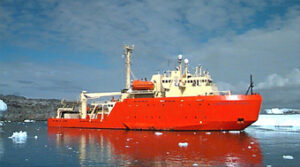Palmer LTER Datasets
Core datasets, including primary and derived measurements from annual cruises as well as other timeseries (long-term weather, sea level, sea surface temperature, etc.), from the Palmer Station LTER are available through the following data catalogs:
Palmer LTER Data Catalog
Officially archived datasets are available on the EDI Data portal, as required by the LTER Network. Datasets are generally updated 6-12 months following each field season.
All papers using LTER data should cite these datasets, which are provided in CSV format, along with fully described metadata and DOIs.
R2R Ship Datasets
Data collected during LTER cruises by the research vessel are also available in the Rolling Deck to Repository (R2R) catalog.
Important Dataset Notes:
- PAL2021 – Station data is very limited this year, due to covid restrictions. No LTER cruise this year.
- PAL2122 – No field season this year, due to the Palmer Station pier rebuild. The LTER cruise occurred earlier than usual in Nov/Dec 2021.
- PAL2223 – Back to normal (!?!) We are currently working to update all of our core station and cruise datasets. We hope to have most of them updated through the 2023 season by the end of this year. However, datasets that require sample processing will take longer, and it may be another year before these datasets are ready.
Merged Data Resources
The following “merged” datasets include discrete water-column variables from over 10 different PAL datasets. These specially merged datasets include data from 1991 to present.
- Merged data from annual PAL LTER field seasons at Palmer Station, Antarctica
- Merged data from PAL LTER research cruises along the Western Antarctic Peninsula
Additional Third-Party Data Resources
- Palmer Station Weather/Meteorological Observations – Available from the Antarctic Meteorology Research Center at the University of Wisconsin-Madison
- Old Palmer Station AMRC Info Page
- New AMRDC Data Repository – Includes weather, waterwall, snow stake and tides.
- Underwater Glider Transects – From Rutgers Slocum Glider data portal
- NOAA Polar Watch is a dedicated to provide ocean satellite data for polar oceans.
- United Kingdom Rothera Time Series is a program of sustained observation focused on crucial Earth System indicators in Antarctica that are vital to UK and global science.
- Palmer LTER genomic sequencing data can be found at BioProject 894179
Palmer LTER Data Policy
Data and information collected by the Palmer LTER project and provided on this site are derived from publicly funded research as part of the U.S. LTER Network. In keeping with LTER policy, data are generally provided under a the Creative Commons Attribution (CC-BY) license, to facilitate collaboration and usage with other researchers and educators.
Data Availability
Annual cruise and station datasets are typically processed and made available in the EDI archive within 6-12 months following each field season. Some physical samples can take longer to process, depending on processing lab availability, but are usually available within 24 months. In addition, shipboard data from PAL annual cruises are processed by the Rolling Deck to Repository (R2R) project and archived with the Marine Geoscience Data System (MGDS). And in compliance with NSF’s specific requirements for Antarctic sites, the PAL project and its data are also listed with the U.S. Antarctic Program Data Center (USAP-DC).
Data Usage Policy
The consumer of these data (“Data User” herein) has an ethical obligation to cite it appropriately in any publication that results from its use. The Data User should realize that these data may be actively used by others for ongoing research and that coordination may be necessary to prevent duplicate publication. The Data User is urged to contact the authors of these data if any questions about methodology or results occur. Where appropriate, the Data User is encouraged to consider collaboration or coauthorship with the authors. The Data User should realize that misinterpretation of data may occur if used out of context of the original study. While substantial efforts are made to ensure the accuracy of data and associated documentation, complete accuracy of data sets cannot be guaranteed. All data are made available “as is.” The Data User should be aware, however, that data are updated periodically and it is the responsibility of the Data User to check for new versions of the data. The data authors and the repository where these data were obtained shall not be liable for damages resulting from any use or misinterpretation of the data. Thank you.
For more information, please see the LTER Network Data Access Policy.




 This site was developed with the support of the National Science Foundation under Grant No. OPP-2224611 and OPP-2026045. Any opinions, findings, and conclusions or recommendations expressed in this material are those of the authors and do not necessarily reflect the views of the National Science Foundation.
This site was developed with the support of the National Science Foundation under Grant No. OPP-2224611 and OPP-2026045. Any opinions, findings, and conclusions or recommendations expressed in this material are those of the authors and do not necessarily reflect the views of the National Science Foundation.